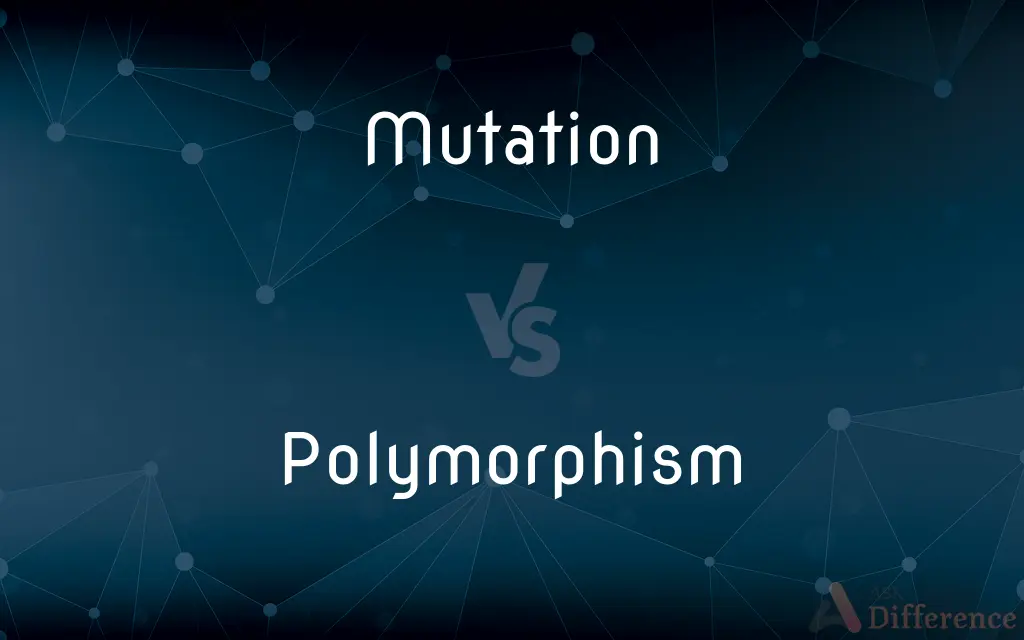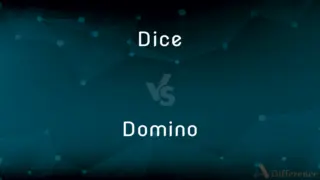Mutation vs. Polymorphism — What's the Difference?
By Urooj Arif & Fiza Rafique — Updated on April 2, 2024
A mutation is a change in DNA sequence, causing genetic diversity and possibly diseases, whereas polymorphism refers to the multiple forms a gene can take, enhancing population adaptability.

Difference Between Mutation and Polymorphism
Table of Contents
ADVERTISEMENT
Key Differences
Mutations involve alterations in the DNA sequence, which can lead to new traits or diseases in organisms, showcasing the dynamic nature of genetic information. On the other hand, polymorphism represents the occurrence of two or more distinct phenotypes within a population, driven by genetic diversity and contributing to the adaptability and survival of species.
While mutations can be beneficial, neutral, or harmful, affecting individual organisms and potentially leading to evolutionary changes, polymorphisms are generally considered a form of genetic variation beneficial for the population's survival. Polymorphisms contribute to the genetic makeup of populations, enabling resilience to environmental changes.
Mutations can occur in various forms, including point mutations, insertions, deletions, and chromosomal alterations, each with distinct impacts on an organism's genetic code and phenotype. Polymorphisms, however, often refer to variations that are relatively common in the population, such as blood types, which do not necessarily lead to adverse health conditions.
Environmental factors, such as radiation, chemicals, and viruses, can induce mutations, illustrating the interplay between organisms and their environments. Conversely, polymorphisms arise from mutations stabilized within a population over generations, highlighting the role of natural selection in maintaining genetic diversity.
Understanding the distinction between mutations and polymorphisms is crucial in fields like genetics, medicine, and evolutionary biology, where mutations may be targeted for treatment or prevention of diseases, while polymorphisms are studied for their role in population dynamics and adaptability.
ADVERTISEMENT
Comparison Chart
Definition
A change in the DNA sequence.
The occurrence of two or more variants of a gene in a population.
Types
Point mutations, insertions, deletions, chromosomal alterations.
Blood type, eye color, and other genetic traits.
Impact
Can lead to new traits, diseases, or have no effect.
Contributes to genetic diversity and adaptability.
Occurrence
Can be rare and often individual.
Common within populations.
Relationship to Diseases
May cause or increase susceptibility to diseases.
Often neutral, with some forms associated with disease susceptibility.
Role in Evolution
Can drive evolutionary change.
Enhances population survival and adaptation.
Inducement
Can be induced by environmental factors or occur spontaneously.
Results from genetic variation being stabilized in a population.
Compare with Definitions
Mutation
An alteration in the DNA sequence that can affect genes and chromosomes.
A mutation in the BRCA1 gene can significantly increase the risk of breast cancer.
Polymorphism
Represents the genetic diversity within a population, offering multiple forms of a gene.
The ABO blood group system is a result of polymorphism in the genes encoding blood antigens.
Mutation
Factors like radiation can induce mutations, leading to changes in the DNA.
Exposure to UV radiation can cause mutations in skin cells, leading to skin cancer.
Polymorphism
Unlike mutations, polymorphisms are common and exist across many individuals.
Polymorphisms in the human population include various skin colors and blood types.
Mutation
Mutations can have a range of effects from harmful to beneficial.
Some mutations confer resistance to diseases, such as sickle cell trait providing resistance to malaria.
Polymorphism
Enables populations to adapt to changing environments.
Color polymorphism in peppered moths allowed adaptation to polluted environments.
Mutation
Mutations are essential for the evolution and diversification of life.
Mutations that improved enzyme efficiency have played a crucial role in the evolution of different species.
Polymorphism
While some can influence disease susceptibility, polymorphisms are generally neutral.
Certain HLA gene polymorphisms are associated with an increased risk of autoimmune diseases.
Mutation
Often occur at a single point in the DNA and can be rare.
The mutation for cystic fibrosis is specific to the CFTR gene.
Polymorphism
Arise from mutations that have been beneficial or neutral over generations.
Lactase persistence in adults is a polymorphism that has evolved in populations with a history of dairy consumption.
Mutation
In biology, a mutation is an alteration in the nucleotide sequence of the genome of an organism, virus, or extrachromosomal DNA. Viral genomes contain either DNA or RNA. Mutations result from errors during DNA or viral replication, mitosis, or meiosis or other types of damage to DNA (such as pyrimidine dimers caused by exposure to ultraviolet radiation), which then may undergo error-prone repair (especially microhomology-mediated end joining), cause an error during other forms of repair, or cause an error during replication (translesion synthesis). Mutations may also result from insertion or deletion of segments of DNA due to mobile genetic elements.Mutations may or may not produce detectable changes in the observable characteristics (phenotype) of an organism.
Polymorphism
(Biology) The occurrence of more than one form, as several alleles of a particular gene or winged and wingless forms of the same species.
Mutation
The act or process of being altered or changed.
Polymorphism
(Chemistry) Crystallization of a compound in at least two distinct forms. Also called pleomorphism.
Mutation
An alteration or change, as in nature, form, or quality.
Polymorphism
The ability to assume different forms or shapes.
Mutation
A change in the nucleotide sequence of the genome of an organism or virus, sometimes resulting in the appearance of a new character or trait not found in the parental type.
Polymorphism
(object-oriented programming) The feature pertaining to the dynamic treatment of data elements based on their type, allowing for an instance of a method to have several definitions. en
Mutation
The process by which such a change occurs, either through an alteration in the nucleotide sequence coding for a gene or through a change in the physical arrangement of the genetic material.
Polymorphism
The property of certain typed formal systems of allowing for the use of type variables and binders/quantifiers over those type variables; likewise, the property of certain expressions (within such typed formal systems) of making use of at least one such typed variable.
Mutation
The nucleotide sequence, trait, or individual that results from such a change.
Polymorphism
(crystallography) The ability of a solid material to exist in more than one form or crystal structure; pleomorphism.
Mutation
A change affecting a sound or a class of sounds, such as back vowels or plosive consonants, through assimilation to another sound, as in the process of umlaut.
Polymorphism
(genetics) The regular existence of two or more different genotypes within a given species or population; also, variability of amino acid sequences within a gene's protein.
Mutation
A change affecting a sound or a class of sounds that is conditioned by morphological or syntactic factors rather than purely phonological factors, as in Irish, where certain words cause the lenition of the initial consonants of the following word.
Polymorphism
Same as Pleomorphism.
Mutation
Any alteration or change.
Polymorphism
The capability of assuming different forms; the capability of widely varying in form.
Mutation
(genetics) Any heritable change of the base-pair sequence of genetic material.
Polymorphism
(chemistry) the existence of different kinds of crystal of the same chemical compound
Mutation
A mutant.
Mutation
(linguistics) An alteration a particular sound of a word, especially the initial consonant, which is triggered by the word's morphological or syntactic context and not by its phonological context.
Mutation
A group of thrushes.
Mutation
Change; alteration, either in form or qualities.
The vicissitude or mutations in the superior globe are no fit matter for this present argument.
Mutation
Gradual definitely tending variation, such as may be observed in a group of organisms in the fossils of successive geological levels.
Mutation
As now employed (first by de Vries), a cellular process resulting in a sudden inheritable variation (the offspring differing from its parents in some well-marked character or characters) as distinguished from a gradual variation in which the new characters become fully developed only in the course of many generations. The occurrence of mutations, the selection of strains carrying mutations permitting enhanced survival under prevailing conditions, and the mechanism of hereditary of the characters so appearing, are well-established facts; whether and to what extent the mutation process has played the most important part in the evolution of the existing species and other groups of organisms is an unresolved question.
Mutation
A variant strain of an organism in which the hereditary variant property is caused by a mutation{3}.
Mutation
(biology) an organism that has characteristics resulting from chromosomal alteration
Mutation
(genetics) any event that changes genetic structure; any alteration in the inherited nucleic acid sequence of the genotype of an organism
Mutation
A change or alteration in form or qualities
Common Curiosities
What is a genetic mutation?
A genetic mutation is a change or alteration in the DNA sequence that can affect an organism's genetic information.
Can mutations be beneficial?
Yes, some mutations can be beneficial by providing advantages such as disease resistance or adaptation to environmental changes.
What role do polymorphisms play in evolution?
Polymorphisms contribute to genetic diversity and adaptability, enhancing a population's ability to survive and evolve.
Is polymorphism a type of mutation?
Polymorphism is a result of mutations that have become stabilized and common within a population.
How are mutations detected?
Mutations can be detected through various genetic tests and DNA sequencing techniques.
What causes mutations?
Mutations can be caused by errors during DNA replication, environmental factors, or can occur spontaneously.
What is an example of a beneficial mutation?
A beneficial mutation is the CCR5-Δ32 mutation, which provides resistance to HIV infection.
Are all mutations harmful?
No, mutations can be harmful, beneficial, or neutral, depending on their nature and the environmental context.
Can polymorphism affect an individual's health?
Certain polymorphisms can influence an individual's susceptibility to diseases or response to medications.
What is a silent mutation?
A silent mutation is a change in the DNA sequence that does not affect the protein produced, thus having no observable effect on the organism.
How does polymorphism differ from mutation?
Polymorphism refers to the presence of multiple genetic forms within a population, often beneficial, whereas a mutation is a specific change in the DNA sequence.
How do polymorphisms occur?
Polymorphisms occur through mutations that are positively selected for or are neutral over generations, leading to commonality within a population.
Why is understanding polymorphism important in genetics?
Understanding polymorphism is crucial for studying genetic diversity, evolutionary biology, and for developing personalized medical treatments based on genetic variability.
Do mutations always lead to genetic disorders?
No, not all mutations lead to genetic disorders; their effects can range from harmful to neutral or even beneficial.
Share Your Discovery

Previous Comparison
Dice vs. Domino
Next Comparison
Attitude vs. StyleAuthor Spotlight
Written by
Urooj ArifUrooj is a skilled content writer at Ask Difference, known for her exceptional ability to simplify complex topics into engaging and informative content. With a passion for research and a flair for clear, concise writing, she consistently delivers articles that resonate with our diverse audience.
Co-written by
Fiza RafiqueFiza Rafique is a skilled content writer at AskDifference.com, where she meticulously refines and enhances written pieces. Drawing from her vast editorial expertise, Fiza ensures clarity, accuracy, and precision in every article. Passionate about language, she continually seeks to elevate the quality of content for readers worldwide.














































